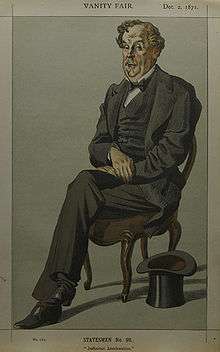Alexander Baillie-Cochrane, 1st Baron Lamington

Baillie-Cochrane as caricatured by James Tissot in Vanity Fair, December 1871
Alexander Dundas Ross Cochrane-Wishart-Baillie, 1st Baron Lamington (24 November 1816 – 15 February 1890), better known as Alexander Baillie-Cochrane, was a British Conservative politician perhaps best known for his association with Young England in the early 1840s.
The son of Admiral of the Fleet Sir Thomas John Cochrane, he succeeded to the Baillie estate at Lamington in 1833.
He attended Cambridge University before entering parliament as a member for Bridport in 1841. He later sat for Lanarkshire, Honiton, and finally the Isle of Wight until 1880 when he was made a peer and went to the House of Lords as Baron Lamington, of Lamington in the County of Lanark.[1]
In 1844 he married Annabella Mary Elizabeth, daughter of Andrew Drummond of Cadlands, Hampshire and a granddaughter of John Manners, 5th Duke of Rutland. They had four children. He was succeeded in his honours and lands by his only son, Charles Wallace Alexander Napier, second baron Lamington, who was appointed governor of Queensland in 1895.
References
- ↑ The London Gazette: no. 24838. p. 2725. 27 April 1880.
- Blake, Robert (1966). Disraeli. New York: St. Martin's Press. ISBN 0-19-832903-2. OCLC 8047.
- Leigh Rayment's Peerage Pages
- Leigh Rayment's Historical List of MPs
 Sidney Lee, ed. (1901). "Cochrane-Baillie, Alexander Dundas Ross Wishart". Dictionary of National Biography, 1901 supplement. London: Smith, Elder & Co.
Sidney Lee, ed. (1901). "Cochrane-Baillie, Alexander Dundas Ross Wishart". Dictionary of National Biography, 1901 supplement. London: Smith, Elder & Co.
External links
- "Archival material relating to Alexander Baillie-Cochrane, 1st Baron Lamington". UK National Archives.
- Hansard 1803–2005: contributions in Parliament by Alexander Baillie-Cochrane
| Parliament of the United Kingdom | ||
|---|---|---|
| Preceded by Henry Warburton and Thomas Alexander Mitchell |
Member of Parliament for Bridport 1841–1846 With: Thomas Alexander Mitchell |
Succeeded by John Romilly and Thomas Alexander Mitchell |
| Preceded by William Lockhart |
Member of Parliament for Lanarkshire 1857 |
Succeeded by Sir Thomas Edward Colebrooke |
| Preceded by Joseph Locke and Archibald Stuart-Wortley |
Member of Parliament for Honiton 1859–1868 With: Joseph Locke, to 1860 George Moffatt, 1860–1865 Frederick Goldsmid, 1865–1866 Julian Goldsmid, 1866–1868 |
Constituency abolished |
| Preceded by Sir John Simeon, Bt. |
Member of Parliament for Isle of Wight 1870–1880 |
Succeeded by Evelyn Ashley |
| Peerage of the United Kingdom | ||
| New creation | Baron Lamington 1880–1890 |
Succeeded by Charles Cochrane-Baillie |